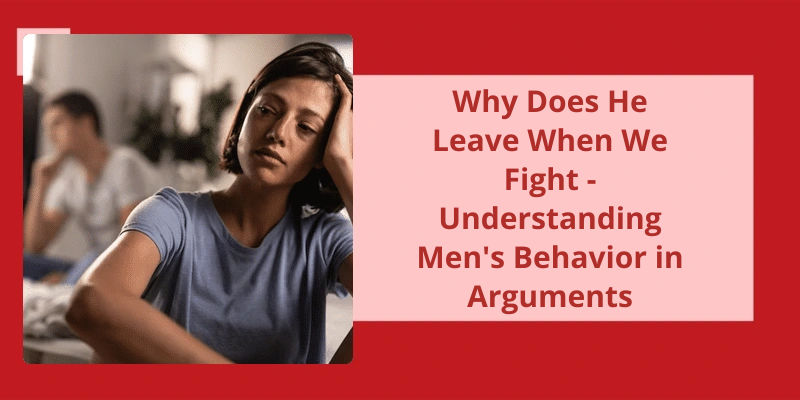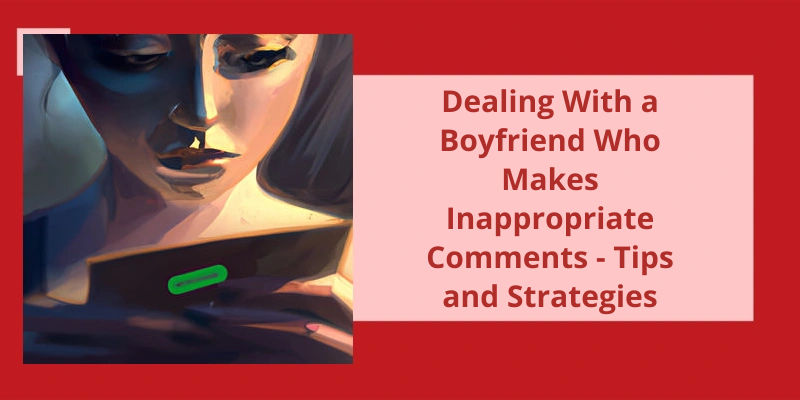It's a common situation that many of us find ourselves in – a disagreement with a loved one that quickly escalates into a full-blown argument. In the heat of the moment, it's easy to say and do things that we don't necessarily mean, but what happens when your partner decides to leave in the midst of it all? It can leave you feeling hurt, confused, and abandoned, wondering why they’d walk away when things get tough. While there’s no single answer to this question, there are a number of factors that may contribute to why someone might choose to leave when conflict arises in a relationship. From personal boundaries and communication styles to past experiences and emotional regulation, understanding why your partner leaves when you fight is key to improving the health and longevity of your relationship.
What Do You Do When Your Partner Leaves After a Fight?
Relationships can be challenging, and arguments are bound to happen. When things escalate and your partner leaves after a fight, it can feel like the end of the world. However, it’s important to remember that the argument doesn’t define your whole relationship. It’s possible to repair your relationship after a fight, and there are steps you can take to do so.
The first thing to do is to give each other some time and space. Emotions are running high after a fight, and sometimes the best thing to do is to cool off. Giving each other space can help you both calm down and process your feelings. It can also prevent saying things that you don’t mean in the heat of the moment.
While youre taking some time apart, it’s important to feel your feelings. Being hurt, angry, or upset is natural, and it’s important to acknowledge those feelings. Ignoring them or pretending they don’t exist won’t help you move forward. Take some time to sit with your emotions and allow yourself to feel them fully.
When youre ready to start communicating again, try to use “I” statements instead of “you” statements. This can help prevent the conversation from becoming accusatory and defensive. For example, instead of saying “you always do this,” try saying, “I feel hurt when this happens.”
Active listening is also an important part of repairing your relationship after a fight. When your partner is speaking, try to listen without interrupting or becoming defensive. Show your partner that you hear them and understand their perspective.
If the conversation becomes too heated or emotional, it’s okay to take a break. Sometimes it can be helpful to come back to the conversation after youve both had time to cool down.
Apologizing and reconnecting is an important step towards repairing your relationship after a fight. Even if you don’t necessarily believe you were in the wrong, apologizing for the way things happened can show your partner that you care about their feelings and the relationship. Reconnecting can happen in small ways, like holding hands or cuddling.
Finally, it’s important to make a plan for the future. Discuss how you can prevent similar conflicts from happening in the future. Identify any triggers or patterns that may have led to the argument and come up with strategies to address them. Remember that repairing a relationship takes time and effort, but it’s possible.
It’s not uncommon for couples to have disagreements or arguments, but what happens after is what really counts. Unfortunately, many women have experienced their partner pulling away after a fight, leaving them feeling confused and frustrated. While it’s easy to assume the worst, there are a variety of reasons why men may pull away after a fight. One common explanation is that they become emotionally distracted or preoccupied. Keep reading to learn more about why this happens and what you can do to re-engage with your partner.
Why Do Men Pull Away After a Fight?
When a fight happens, it can be emotionally draining for both parties. Men may feel like they need space to process their feelings or analyze the situation. It’s not necessarily that they don’t care, but rather that they need to distance themselves to regain composure and perspective. Men may also pull away after a fight because they fear confrontation or that their feelings won’t be validated. This is especially true if the argument was particularly heated or emotionally charged. It’s important to keep an open line of communication and reassure your partner that their feelings are important to you.
Different personalities also come into play when dealing with conflict. Men who’re conflict-avoidant may pull away because they’d rather avoid an argument altogether. They fear that arguments can escalate and become irreparable. On the other hand, men who’re more confrontational may need space to process their emotions and come back with a level head. In either case, it’s important to understand that everyone deals with conflict differently.
It could be a combination of emotional stressors, personality traits, and even past experiences with conflict. The important thing is to give your partner space if they need it, while still letting them know that youre there for them. It’s also crucial to address the underlying issues and work toward a resolution together. A healthy relationship involves communication, compromise, and understanding.
It’s important to take a step back and evaluate whether the relationship is fulfilling both partners needs. Are there underlying trust issues or unresolved conflicts that need to be addressed? Are there communication barriers that need to be broken down? Sometimes, taking some time apart can help bring clarity to these issues and allow both partners to reflect on what they truly want.
However, if this pattern of behavior becomes habitual or indicative of larger relationship issues, it may be time to reassess the relationship dynamic. Open communication, compromise, and respect are essential for a healthy and fulfilling partnership.
How to Effectively Communicate With a Partner After a Fight.
When you and your partner have a disagreement, give yourselves time and space to process your own emotions before initiating a conversation. When you do speak, listen actively and avoid using accusatory language. Use “I” statements to express your own feelings and avoid blaming your partner. Try to find common ground and come up with a solution together. Remember to apologize if necessary and end the conversation on a positive note.
Conclusion
It could be a way to avoid further escalation, an attempt to regain control of the situation, or simply a means of self-preservation. However, understanding why someone chooses to leave is crucial in finding a resolution to the conflict, as it allows for open communication and empathy towards their perspective. Ultimately, recognizing and addressing these underlying factors can lead to healthier and more productive conflict resolution, allowing both parties to come to a better understanding and potentially strengthen their relationship.






